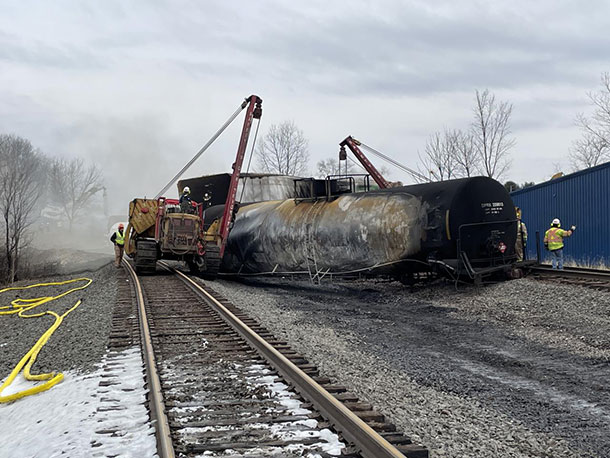News & Politics
State officials ramp up scrutiny on Norfolk Southern’s handling of Ohio train derailment
Democrats and Republicans have called for the company to be held accountable for the incident.

Gov. Josh Shapiro looks on during a meeting with emergency management officials. Commonwealth Media Services
Pennsylvania public officials are increasing pressure on the rail company responsible for responding to the site of a Feb. 3 train derailment near the Pennsylvania-Ohio border that prompted government officials to evacuate the area due to a threat of a dangerous explosion.
Gov. Josh Shapiro, U.S. Sens. Bob Casey and John Fetterman, state Senate Majority Leader Joe Pittman and others are calling for greater oversight into Norfolk Southern Corporation’s handling of response efforts, which included venting train cars to release vinyl chloride gas. Following the derailment, the vinyl chloride became unstable due to pressure relief devices failing inside some train cars, the railroad said. As a result, the company conducted a release of toxic and deadly fumes into the air to prevent an explosion that could have sent shrapnel through the air, as well as fumes.
According to the U.S. Environmental Protection Agency, 53 cars from a Norfolk Southern train derailed on Feb. 3 in East Palestine, Ohio, less than one mile from the Pennsylvania border. Ohio Gov. Mike DeWine and Shapiro then announced an evacuation notice on Feb. 6 for residents within a one-mile by two-mile radius around East Palestine. Residents were allowed to go back home starting Feb. 8.
The EPA said their air monitoring did not detect “chemical contaminants of concern” after the controlled burn occurred, but have said that soil contamination occurred. DeWine said Friday that part of the Sulphur Run stream in Ohio is “severely contaminated.”
In the days and weeks that have followed the controlled release of the chemicals, government officials have begun ramping up criticism of Norfolk Southern, accusing them of poor communication throughout the response process, while calling for in-depth reviews of what happened.
In a letter to Norfolk Southern President and CEO Alan Shaw, Shapiro said he had “serious concerns” about how the company has managed the situation. The governor said Norfolk Southern employees separated themselves from the rest of the management structure at the incident command post, which he said created confusion and resulted “in a general lack of awareness for first responders and emergency management on the tactics Norfolk Southern planned in response.”
Shapiro also said that the railroad failed to alert Pennsylvania officials of the derailment, noting that officials at the Pennsylvania Department of Environmental Protection and the Pennsylvania Emergency Management Agency learned of the incident hours later. Shapiro has asked the Pennsylvania Public Utility Commission to review Norfolk Southern’s handling of the incident.
Casey and Fetterman also weighed in, joining forces with Ohio Sens. Sherrod Brown and JD Vance to ask that the U.S. Environmental Protection Agency and the National Transportation Safety Board hold the railroad accountable.
“While we are grateful no injuries or fatalities resulted directly from the derailment, we are deeply concerned about the release of hazardous materials into the air and groundwater in East Palestine and surrounding communities,” the four senators wrote in a letter to the EPA, adding that hundreds of families are “rightfully concerned about long-term health risks.”

State Sen. Joe Pittman, the Majority Leader of the Pennsylvania Senate, said in a statement that the “public deserves detailed answers about the handling of this incident.”
“Discussions with Senate committees holding jurisdiction over these areas have begun to take place,” Pittman said. “It is imperative the legislature engages in a deeper conversation and examination of our infrastructure system and meaningful ways to further ensure public safety when it comes to these infrequent but gravely serious events.”
State Sen. Wayne Langerholc, who chairs the Senate Transportation Committee, additionally scheduled a fact-finding public hearing on hazardous materials that are transported by rail in Pennsylvania for Feb. 27 at the state Capitol. The Senate Veterans Affairs and Emergency Preparedness Committee will host a hearing of its own on the derailment on Thursday, Feb. 23, at 10 a.m. at the Community College of Beaver County.
Shapiro, PEMA Director Randy Padfield and Acting DEP Secretary Rich Negrin met with the Beaver County Board of Commissioners this week, and the board said in a statement that they support Shapiro’s efforts to hold the company accountable. “We want to emphasize to the citizens of Beaver County, there has been nothing to date to indicate air, water or soil in Beaver County has been compromised as a result of this train derailment,” the commissioners said in a press release, adding that state and federal officials will let them know if that changes.
Norfolk Southern did not immediately respond to a request for comment for this story. On their website, the railroad said they have distributed more than $1 million to residents to cover evacuation costs, as well as $220,000 for the East Palestine Fire Department to purchase breathing apparatuses.
However, railroad officials skipped a recent town hall on the matter, telling News 5 Cleveland that they became “increasingly concerned about the growing physical threat to our employees and members of the community.”
The EPA is continuing to conduct indoor air monitoring in the area, while the Columbiana County General Health District in Ohio is completing private well sampling.
Meanwhile, Shapiro said on Feb. 16 that the Pennsylvania DEP will be conducting its own water sampling to monitor water for any potential contamination resulting from the site.
“Our independent testing will ensure the data we are receiving is accurate and timely so we can partner effectively with local communities to provide the information Pennsylvanians need and deserve,” he said.
